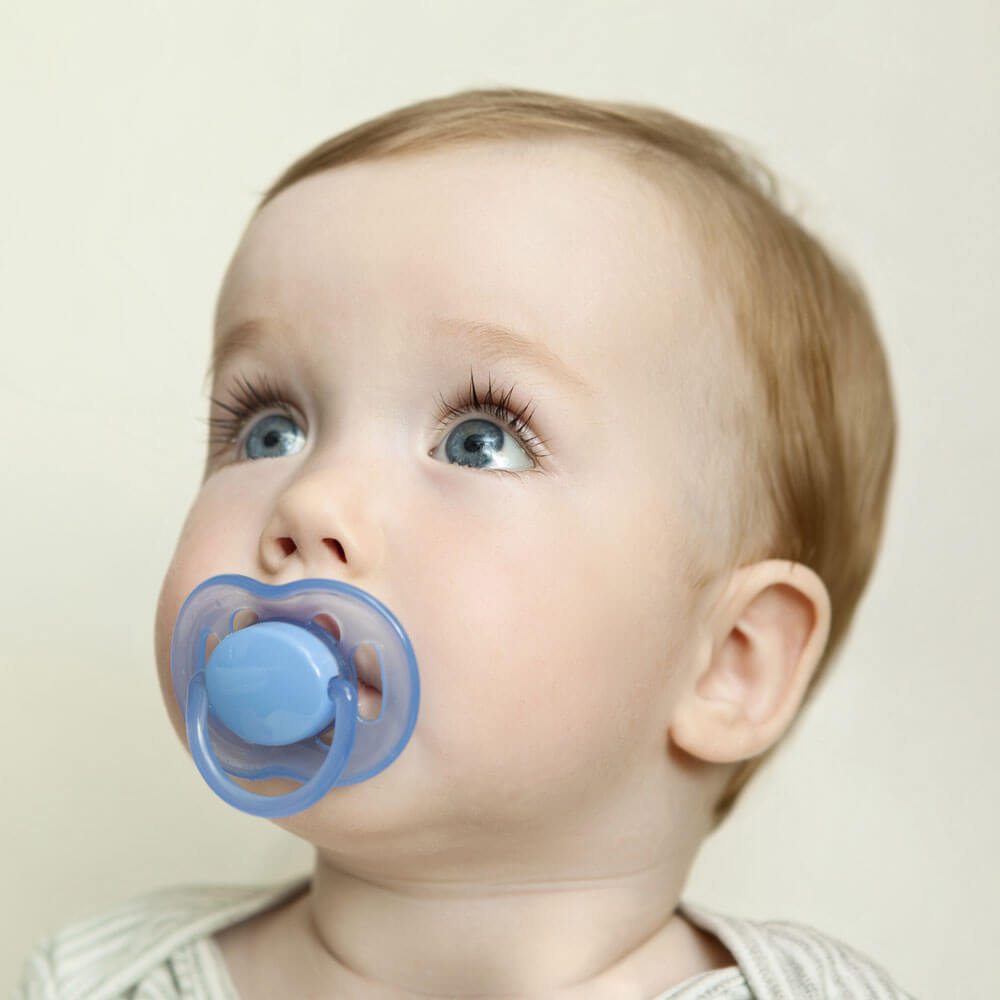
Long-Term Effects of Thumb Sucking and Other Habits on Baby and Permanent Teeth
What to know about habits babies and children often develop such as thumb sucking that can have long-term effects on their oral health, teeth, jaw, and roof of the mouth.
Did you ever wonder why babies and young children suck their thumbs and if there are any benefits to it? It seems like babies and young children are always sticking things in their mouths and sucking on them. Sucking thumbs, fingers, pacifiers, and other objects is considered a natural reflex in babies. It gives them comfort and helps them fall asleep. Thumb sucking is a self-soothing, reflexive behavior that can begin before birth. Prenatal images often show babies with their thumbs in their mouths.
So, the answer is, there are some benefits if the habit is short-term, but there are downsides if thumb sucking continues past age 3 or 4.
Potential damage from thumb sucking

Long-term, pressure on the teeth, jaw, and roof of the mouth while thumb sucking can result in:
- Protrusion of the front teeth (overbite)
- The bottom teeth tipping back into the mouth
- Crooked and crowded teeth
- An open bite—when the teeth do not meet when the mouth is closed
- Difficulty biting through foods and chewing
- The roof of the mouth narrowing and pushed further up than normal
- Sensitivity in the oral tissues and roof of the mouth.
Keeping in mind that children should begin visiting a dentist by age 1, be sure to monitor and inform the dentist if their teeth seem to be protruding, they have any problems biting through or chewing food, or you notice changes in speech after continued thumb sucking. The dentist will be sure to watch for and address any conditions that do not self-correct when permanent teeth start to come in.
When permanent teeth are damaged by thumb sucking, the child may need orthodontics and other dental treatments, including tooth removal. Unchecked, the long-term effects of thumb sucking damage can impact a child’s ability to speak clearly, as well as cause excessive enamel wear and increase the incidence of tooth decay and gum disease.
How to dissuade thumb sucking
Children usually stop sucking their thumbs between the ages of 2 and 4. Children aged 4 and up should be discouraged from sucking their thumbs to avoid potential permanent damage to their teeth or jaw. The child’s dentist or pediatrician can advise ways to curtail or eliminate the habit if breaking it is proving difficult.
Because thumb sucking is a self-soothing activity, parents could identify the triggers that result in thumb sucking. These can range from:
- Boredom
- Absent mindedness
- Tiredness
- Stress or anxiety
- Hunger
- Misalignment of teeth
- An attempt to ease pain, like teething or an earache
- Side effects of certain medications
For children who are having a hard time stopping thumb sucking, parents can try distracting them with activities where they have to use their hands, like drawing, building things, and playing games or a musical instrument.
Physical prevention
If the situation is not improving, an orthodontic device can interrupt the thumb sucking cycle. Both removable and nonremovable devices are options. A variety of thumb guards are available, made from soft plastic or fabrics. Substitutes for this self-soothing are also options, like a plush or silky soft toy, blanket, or combination of the two.
Are pacifiers good substitutes for thumb sucking?

Other habits to watch for
Teeth grinding is another common habit, even in toddlers. It is estimated that 2 or 3 out of 10 children grind or clench their teeth. It usually occurs while they are sleeping and may begin when their teeth first start erupting at around 6 months, or at ages 5 to 6 when the permanent teeth start to come in. It may be that children are just testing out how their teeth work, but the triggers common for thumb sucking apply here, too.
Additionally, nail biting is a potentially life-long habit that can start early in children. An estimated 50% of children 10-18 years old are already in the habit of nail biting, which is also considered a self-soothing reflex to manage anxiety. Chronic nail biting can result in:
- Bruxism
- Malocclusion
- Weakened tooth roots
- Soft tissue damage from cuts, punctures, and tears
- Damage to restorations and orthodontic brackets and wires
- Bad breath
- Oral and finger/fingernail infections
Children can grow out of the habit of nail biting, but if they do not, the consequences can include chronic jaw pain or injury to their teeth and gums. Damage to the dentition may require restoration with tooth-colored materials, root canals, or pediatric crowns. If the dentist sees moderate evidence of tooth damage, they may first prescribe a nightguard to protect the teeth.
Children will find it as difficult to stop nail biting as they do thumb sucking and teeth grinding. Things that may help stop nail biting include keeping nails too short to bite, trying alternative self-soothing distractions like stress balls and fidget spinners, or practicing yoga or meditation to relax. Chewing sugar-free gum may also deter nail biting.
To avoid long-term effects, stop bad habits such as thumb sucking and nail biting and start good dental practices today. For further education and guidance on oral health, visit https://chengcrowns.com/about/blog/.
Resources
Can nail biting affect your child’s smile? Learn more from a pediatric dentist. Brush Pediatric Dentistry. January 12, 2020. https://www.brushforkids.com/blog/2020/01/12/can-nail-biting-affect-your-childs-smile-learn-more-from-a-pediatric-dentist/. Accessed March 3, 2023.
Khorsandi J. How nail biting affects the teeth. Byte. July 19, 2022. https://www.byte.com/community/resources/article/how-nail-biting-affects-teeth/. Accessed March 3, 2023.
Mayo Clinic. Children’s health. Thumbsucking: help your child break the habit. https://www.mayoclinic.org/healthy-lifestyle/childrens-health/in-depth/thumb-sucking/art-20047038. Accessed March 3, 2023.
Mouthhealthy. American Dental Association. Available at https://www.mouthhealthy.org/all-topics-a-z/thumbsucking. Accessed March 3, 2023.
Whelan C. What are the effects of thumb sucking on the teeth and mouth? April 3, 2018. https://www.healthline.com/health/parenting/thumb-sucking-teeth. Accessed March 3, 2023.